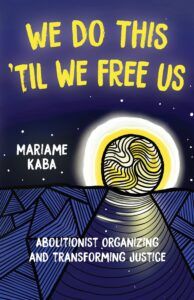Editor’s Note: the credit for the term “prison industrial complex” was changed to other include incarcerated people and activists.
The prison industrial complex is a term you may have heard if you’ve looked into abolitionist thinking or learned about the contexts around social movements like Black Lives Matter. It’s a term that, as defined by abolition group Critical Resistance, describes “overlapping interests of government and industry that use surveillance, policing, and imprisonment as solutions to economic, social and political problems.” While the concept of the prison industrial complex covers a huge number of social structures, you’ll most frequently hear it used in discussions about mass incarceration, for-profit prisons, and how criminalising and imprisoning people benefits the rich and powerful (particularly politicians and CEOs) while doing nothing to tackle or prevent harm that takes place within society at large.
The term “prison industrial complex” was coined by activists as well as incarcerated people and their families. And a number of academics and writers have provided powerful critiques of the prison industrial complex — Angela Y. Davis with Are Prisons Obsolete?, Michelle Alexander with The New Jim Crow: Mass Incarceration in the Age of Colorblindness, Elizabeth Hinton with From the War on Poverty to the War on Crime: The Making of Mass Incarceration in America, and many less formalised writings from abolitionist groups and activists.
There has been a great deal of writing and literature about the prison industrial complex — but are books one of the structures supporting the system itself?
|
|
Copaganda and Pro-Prison Literature
In my earlier article on copaganda in crime books, I explored how literature, particularly the detective genre, has often bolstered a pro-police social agenda. The same is true for the prison industrial complex, and pro-carceral justice structures. In detective fiction, prison for the villain is often a major part of a happy ending — although in many crime books, the conclusion involves the murderer dying in a showdown with the hero, rather than being incarcerated. Literature often portrays prison as largely unproblematic, the only issue being when innocent people are imprisoned. While miscarriages of justice are enormously harmful, the prison system also enacts enormous and disproportionate violence on people who have committed the crimes they are accused of; however, social attitudes to this are very different, with the refrain “if you can’t do the time, don’t do the crime” commonly thrown back at people who argue against carceral abuses.
In many books, including children’s literature, prison is even played for laughs. The Wind in the Willows sees Mr. Toad imprisoned for 20 years for anti-social behaviour, particularly his dangerous driving; he later escaped by dressing as a washerwoman. (You could argue that the most fantastical thing about The Wind in the Willows is the idea that a rich, socially powerful playboy would face serious prison time for driving too fast, instead of his wrongdoing being dismissed as “affluenza.”)
Throughout the majority of literature, prisons are represented as frightening but necessary institutions that largely keep the public safe, only harmful when people are incarcerated for a crime they didn’t commit. There is little focus on, or care for, the harm that prisons cause to people who have committed crimes, or their harm to society as a whole. The area of literature that has paid the greatest amount of attention to the harms of the prison industrial complex is the prison memoir, but, once again, the most successful examples of these are books by political prisoners, or people incarcerated because of racism or other forms of bigotry, such as Nelson Mandela or the Exonerated Five. These stories are incredibly important, but they also show how incarcerated people are generally only portrayed as sympathetic if the person is “not a real criminal,” but someone who has been done wrong by the system, instead of considering the possibility that the system of imprisonment is itself wrong. “Real criminals” don’t get the same kind of sympathy or humanisation in literature, and it is rarely suggested that the prison industrial complex itself may be the true villain.
How Books Break Down the Prison Industrial Complex

Books can also be a crucial part of breaking down the prison industrial complex. Abolitionist non-fiction is an important category of literature, full of critical texts and memoirs that make the case for an anti-carceral future. Books like Angela Y. Davis’s Are Prisons Obsolete?, We Do This ‘Til We Free Us by Mariame Kaba, or We Will Not Cancel Us: And Other Dreams of Transformative Justice by adrienne maree brown set out the case for different forms of justice that address current harm and prevent future damage to society and the people who inhabit it.
There are also many important pieces of anti-carceral writing that are not published as full-length books, many of which have been collated by abolitionist groups as reading lists. However, there is far less fiction out there that imagines a world without the prison industrial complex. While nonfiction is a crucial part of building and developing any movement, fiction can be a more accessible way for people to access ideas and change their perspectives. (On a personal level, I owe a huge chunk of my inclusive and progressive beliefs to the fiction of Malorie Blackman and Terry Pratchett.) Some fiction creates worlds with restorative justice and non-carceral options; Pet by Akwaeke Emezi is set in a utopian future where harms are addressed with community accountability and restorative justice. However, there are many more fiction stories that revolve around the prison industrial complex as the only possible option. In order to change this system, we first have to imagine something better.
To learn more about the battle to ensure incarcerated people have access to books, read our article on The Ever-Growing Challenges of Getting Books Into Prisons. To develop your knowledge on movements like abolitionism, try Beyond the Basics: Books for a Political Education and Liberation.
Source : How Books are Used to Perpetuate the Prison Industrial Complex















